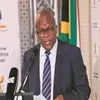Xitsonga Live Radio Stations
Radio Stations
Choose a Language
Radio stations that broadcast in Xitsonga language are an integral part of the media landscape in South Africa, particularly in the Limpopo province, where Xitsonga is widely spoken. These radio stations serve a crucial role in preserving and promoting the language, culture, and traditions of the Tsonga people.
Xitsonga is one of the official languages of South Africa and is spoken by over 3 million people in the eastern parts of the country. It is a tonal language that is closely related to Shona and Ndebele, which are spoken in Zimbabwe, and Chichewa, which is spoken in Malawi.
Radio stations that broadcast in Xitsonga language provide a platform for the local community to share news, opinions, and information that is relevant to their daily lives. These stations typically feature a mix of music, news, and talk shows, with programming that is tailored to the interests and needs of their listeners.
Music plays a significant role in Xitsonga radio stations, with a focus on local and traditional music genres such as Tsonga disco, Xitsonga traditional music, and Maringa music. These music genres are an essential part of the cultural identity of the Tsonga people and are celebrated through music festivals and events throughout the year.
In addition to music, Xitsonga radio stations also provide news and current affairs programming, with a focus on local issues and events. This includes coverage of community events, sports, and politics, as well as news from around the country and the world.
Talk shows are another essential component of Xitsonga radio programming, with discussions on a wide range of topics that are relevant to the local community. These shows often feature guests such as community leaders, experts, and other influential figures, who share their perspectives on issues that affect the community.
Overall, radio stations that broadcast in Xitsonga language are a vital part of the cultural and linguistic heritage of the Tsonga people and play a critical role in preserving and promoting the language and traditions of this community. These stations provide a platform for the local community to connect and engage with each other and to share their stories, experiences, and perspectives with a wider audience.
Xitsonga is one of the official languages of South Africa and is spoken by over 3 million people in the eastern parts of the country. It is a tonal language that is closely related to Shona and Ndebele, which are spoken in Zimbabwe, and Chichewa, which is spoken in Malawi.
Radio stations that broadcast in Xitsonga language provide a platform for the local community to share news, opinions, and information that is relevant to their daily lives. These stations typically feature a mix of music, news, and talk shows, with programming that is tailored to the interests and needs of their listeners.
Music plays a significant role in Xitsonga radio stations, with a focus on local and traditional music genres such as Tsonga disco, Xitsonga traditional music, and Maringa music. These music genres are an essential part of the cultural identity of the Tsonga people and are celebrated through music festivals and events throughout the year.
In addition to music, Xitsonga radio stations also provide news and current affairs programming, with a focus on local issues and events. This includes coverage of community events, sports, and politics, as well as news from around the country and the world.
Talk shows are another essential component of Xitsonga radio programming, with discussions on a wide range of topics that are relevant to the local community. These shows often feature guests such as community leaders, experts, and other influential figures, who share their perspectives on issues that affect the community.
Overall, radio stations that broadcast in Xitsonga language are a vital part of the cultural and linguistic heritage of the Tsonga people and play a critical role in preserving and promoting the language and traditions of this community. These stations provide a platform for the local community to connect and engage with each other and to share their stories, experiences, and perspectives with a wider audience.


